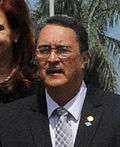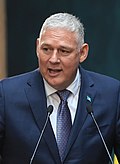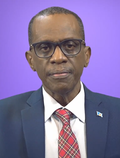| Prime Minister of Saint Lucia | |
|---|---|
| Pwèmyé Minis Sent Lisi | |
 | |
| Style | The Honourable |
| Residence | Prime Minister’s Official Residence at Vigie, Castries |
| Appointer | Governor-General |
| Term length | Five years renewable |
| Formation | 22 February 1979 |
| First holder | John Compton |
| Deputy | Deputy Prime Minister of Saint Lucia |
| Salary | EC$136,849 / US$50,685 annually [1] |
| Website | Government website |
 |
|---|
| Administrative divisions |
This is a list of prime ministers of Saint Lucia . The prime minister is the head of government of Saint Lucia. The prime minister heads the executive branch and chairs the cabinet.









